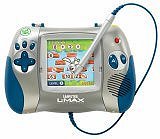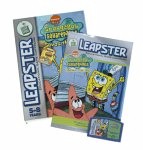Last year's Leapster has already been updated. The Leapster L-Max is a handheld portable unit that mimics Nintendo's GameBoy, but with important differences that make it not only more kid-friendly, but exceptionally more educational as well. The comparatively large screen is also a touch screen, and kids interact with the games by using a directional pad and an attached stylus. Game cartridges, available separately, offer children "edutaining" games that support learning. What's the main difference between the Leapster and the Leapster L-Max? Besides a slightly less bulky unit, the L-Max can be played as a portable or can be plugged into the TV and played on both the little and "big" screens. The unit is backwards compatible -- the original Leapster game cartridges can be played on the new unit. Most of the original games play on both the portable and TV screens, while some only play on the handheld. Read our full review of the L-Max here. [For more information, user reviews, or to buy: Leapster L-Max - affiliate link]
Leapster Multimedia Learning System [For more information, user reviews, or to buy Leapster (affiliate link) at Amazon.com]
The LeapPad & Quantum Pad Learning Systems Each of these learning pads come packaged with a "sampler" book that engross children for a time, but eventually they'll want more books. And more books is likely what they'll get--these learning pads are well-established and popular, and libraries of books, spanning across the curriculum, are available for purchase. Some of the books feature licensed favorites (Winnie the Pooh, Dora the Explorer, and Harry Potter are just some of the licenses), while others stand well on their own with either the Leap characters for younger kids, or no characters at all--just fun presentations of school subjects.
While the sampler book included with the LeapPad is a bit of a tease, the one in the Quantum Pad package has a longer life expectancy. It's terrific! The geography games are entirely addictive (for adults too)--you have to race the clock to find as many requested states, capitals, or, in the case of the map of Europe, countries. There's a solar system spread, work with fractions and multiplication, a spelling bee, and more. These systems are worth the purchase. They are very expandable -- which is both a pro and a con. The good news is that the system is not going to blow out of steam too quickly; and the bad news is that it can get quite costly. There's the cost of the units themselves (about $40-50 US each), additional books (about $15 apiece), and the batteries. For more information, user reviews, or to buy, follow these links:
LeapPad - affiliate link LeapPad Plus Writing (the second version of the Leap Pad that incorporates writing letters, numbers, shapes, and words into the learning system).
These are some of our favorite additional books for the systems (remember any of these books work in both the Quantum Pad and the LeapPad Learning Systems):
LeapStart Pre-Reading Book: The Birthday...Surprise: This is one of the
better books in the LeapPad Library--teaches phonics, pre-reading
skills through a story starring the Leap characters. Other good books are the Quantum Pad Smart Guides (affiliate link) to different grade levels (Grade 3, Grade 4, Grade 5) and books starring the Magic School Bus. Newly available are those focused on specific subjects and grades, such as Quantum Pad Book: 3rd Grade Science. |
The iQuest Interactive Talking Handheld
 The
iQuest is an electronic
handheld unit that allows kids to play educational games, maintain
an address book and schedule/calendar, consult a dictionary, use a
calculator, and more. The unit comes with a set of quizzes
designed to develop 5th to 8th grade skills in Math, Science, and
Social Studies. Owners of the iQuest can purchase more quiz packs
separately if they wish.
The
iQuest is an electronic
handheld unit that allows kids to play educational games, maintain
an address book and schedule/calendar, consult a dictionary, use a
calculator, and more. The unit comes with a set of quizzes
designed to develop 5th to 8th grade skills in Math, Science, and
Social Studies. Owners of the iQuest can purchase more quiz packs
separately if they wish.
Kids can take electronic notes, consult
the Merriam Webster's  School Dictionary, add reminders and events
to their calendar, and use the unit as a calculator. Although
there is a volume control, the unit starts up at a default volume
level that is a little too loud. However, all in all, the iQuest
is a handy little portable handheld that kids will be proud to
own. It comes in black, red, and purple, and is designed for
children ages 10-13.
School Dictionary, add reminders and events
to their calendar, and use the unit as a calculator. Although
there is a volume control, the unit starts up at a default volume
level that is a little too loud. However, all in all, the iQuest
is a handy little portable handheld that kids will be proud to
own. It comes in black, red, and purple, and is designed for
children ages 10-13.
[For more information, user reviews, or to buy iQuest: Black, iQuest: Red, or iQuest: Purple affiliate links]
![]()






 Both systems have their own strengths, simply because they
target different age groups and the educational possibilities are
endless for each group. However, it is interesting to note that
the books for both the LeapPad and the Quantum Pad work in either
unit. The only significant differences between the two systems is
their look and lingo. The Quantum Pad is a sleeker-looking unit that
appears less like a toy than the LeapPad, and thus it goes over well
with older kids. But most parents know that even preschoolers are
attracted to things that don't "look" their age. The
point here is that purchasing a Quantum Pad for your kids will
likely take care of your 3 year old as well as your more
technologically savvy 9 year old, as long as you purchase a book
or two that is appropriate for your 3 year old's educational level
(which you would likely want to do regardless).
Both systems have their own strengths, simply because they
target different age groups and the educational possibilities are
endless for each group. However, it is interesting to note that
the books for both the LeapPad and the Quantum Pad work in either
unit. The only significant differences between the two systems is
their look and lingo. The Quantum Pad is a sleeker-looking unit that
appears less like a toy than the LeapPad, and thus it goes over well
with older kids. But most parents know that even preschoolers are
attracted to things that don't "look" their age. The
point here is that purchasing a Quantum Pad for your kids will
likely take care of your 3 year old as well as your more
technologically savvy 9 year old, as long as you purchase a book
or two that is appropriate for your 3 year old's educational level
(which you would likely want to do regardless). 